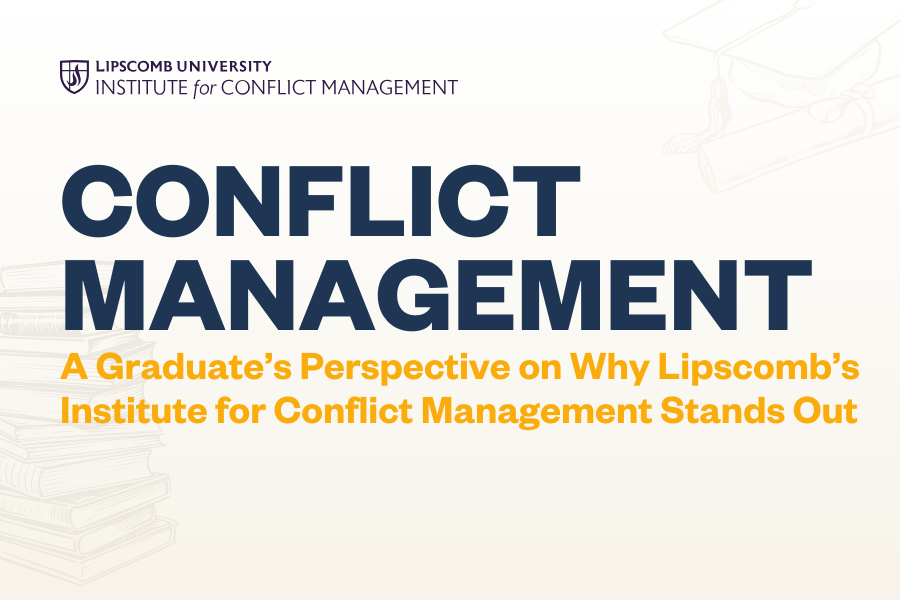Conflict Management: A Graduate’s Perspective on Why Lipscomb’s Institute for Conflict Management Stands Out
August 14, 2024

Conflict is an inevitable part of daily life. It is something that can take place on a large scale, such as a workplace dispute, and or a small scale, such as deciding where to eat.
As a recent college graduate of the Law, Justice, and Society program at Lipscomb and with the intention of attending law school and pursuing a Ph.D., I looked for a master’s degree program that not only would help me glean invaluable knowledge, but also be applicable to the real world. This is something that I found within the conflict management program. Not only was I taught skills and expertise on managing different conflict situations, such as mediations, negotiations, and communication breakdowns, but I also was able to use these skills and expertise in real world conflicts, especially in my daily conflicts. The following list will share some reasons why the teachings by ICM can also be applicable to you.
1. Applicability
ICM teachings are applicable to anybody that faces conflict in their lives. (Hint: that is everybody!) The Institute’s teachings range from general communications with others to highly sophisticated world disputes. In addition, ICM offers specialized classes and training for certain professionals, such as their highly rated Rule 31 Mediator training program.
2. Transferability
3. Flexibility
ICM teaches skills and expertise that extend beyond basic book knowledge and real world application, but also to help better understand one’s own strengths and weaknesses in approaching conflicts to overall become more flexible and resilient in handling conflicts. Also, ICM is flexible by allowing students to complete the courses at their own pace, having classes conveniently scheduled for intensive weekends, and for having two options to complete the program: a certificate or a master's in conflict management.
These reasons have been particularly relevant for me in managing my daily conflicts and in managing conflicts that arise in my law school and Ph.D. coursework. For example, when discussing politically charged topics in my coursework, I am able to take the teachings from ICM of first finding root problems of conflicts to more fully understand the underlying problem in the conflict. This helps to bring more relevant and more likely solutions to conflicts. Additionally, while at the Institute I was fortunate to be able to take conflict management courses that were centered upon legal topics. For example, one course offered as part of the foundational courses of the program is mediation. It was through this course I was able to hone in my civil legal mediation skills, connect with other legal scholars from outside the program, and become the youngest Rule 31 Mediator in the state of Tennessee.
Lipscomb University Institute for Conflict Management has served as an essential and invaluable foundation for my law school and Ph.D. coursework, my future professional career, and helped me become a better follower of Heavenly Father. President Ronald Reagan once stated, “peace is not the absence of conflict, it is the ability to handle conflict by peaceful means.” At the Institute, you will be taught and equipped with the skills necessary to navigate conflicts that you face in your life. You will be taught by renowned professors such as Professor Tracey Allen and Dean Steve Joiner that will push you to become your best self. You will become more able and confident in handling any conflict situation. The Institute is meant for everyone that may want to improve how they handle conflicts in their life.
About the Author
About the Institute for Conflict Management
Our flexible setting and ready-to-use skills make our program unique and offer you the ability to solve complex conflicts, even while you are gaining course credit. Gain a core understanding of the principles of conflict management through coursework. ICM offers an MA and Graduate Certificate in Conflict Management, as well as Tennessee Rule 31 mediation training. Learn More about Conflict Management offerings.
College of Leadership and Public Service News